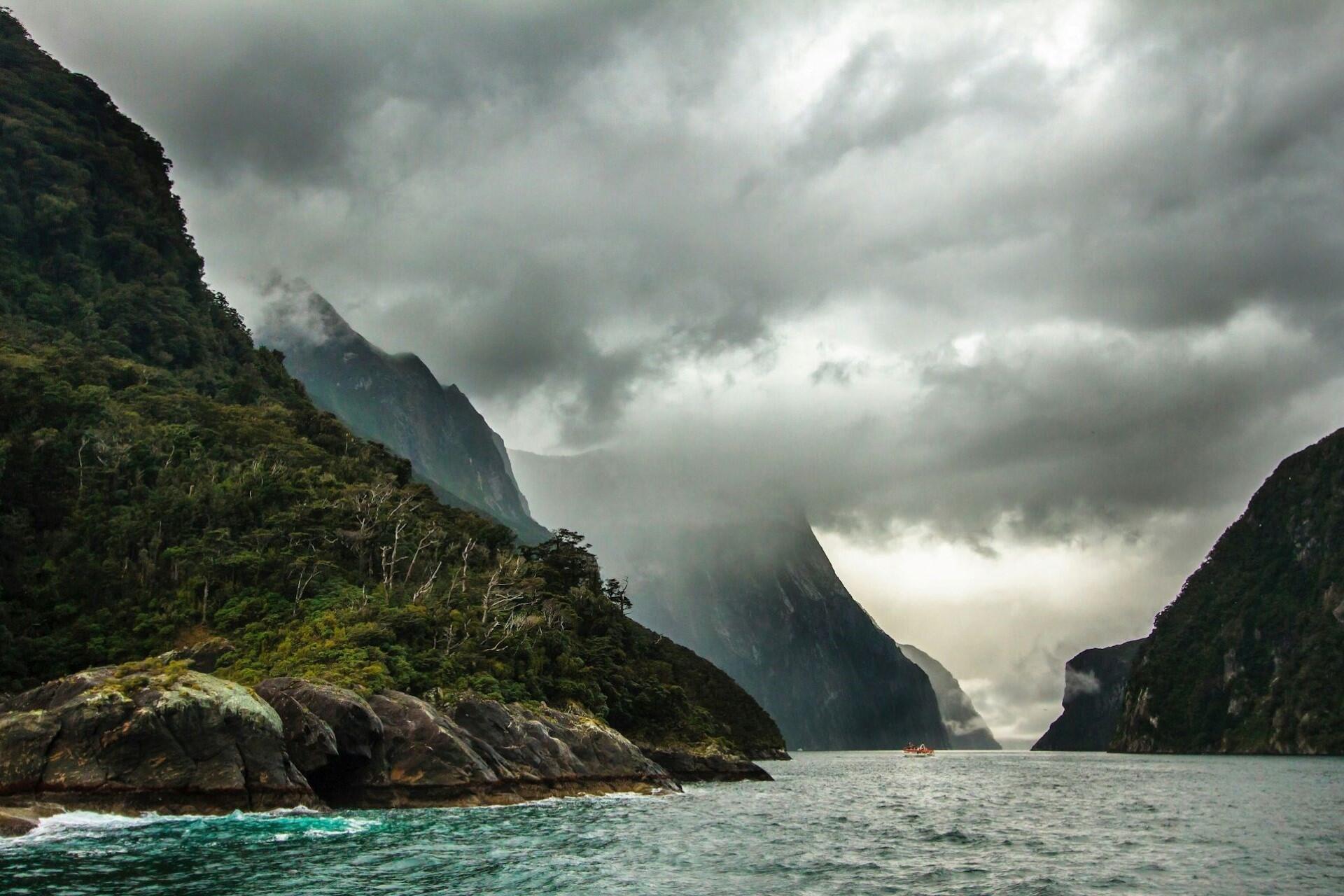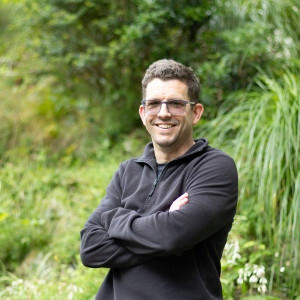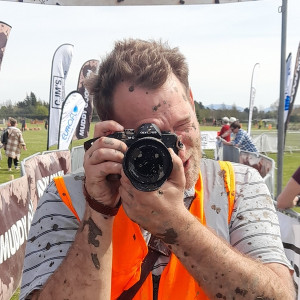The mountains are calling and I must go.
John Muir
Milford Sound, or Piopiotahi in Māori, is the crown jewel of Fiordland National Park. It's carved by glaciers and cloaked in mists with towering cliffs, thunderous waterfalls, and mirror-like waters. This remote corner of New Zealand is regularly cited as one of the most scenic places in the world.
Milford Sound is located on the South Island, and its rainfall is among the highest in the world. However, there's nothing like a rainy day at Milford Sound. More rain means more waterfalls, more mist, and more magic.
Here, we'll tell you everything you need to know about visiting and how to get the best photos.

Why Milford Sound Is One of New Zealand’s Natural Wonders
Milford Sound, or Piopiotahi, is one of those places that takes your breath away and one of the best locations for photography in New Zealand. Towering cliffs plunge into dark, glassy waters. Waterfalls tumble from rainforest-clad peaks.
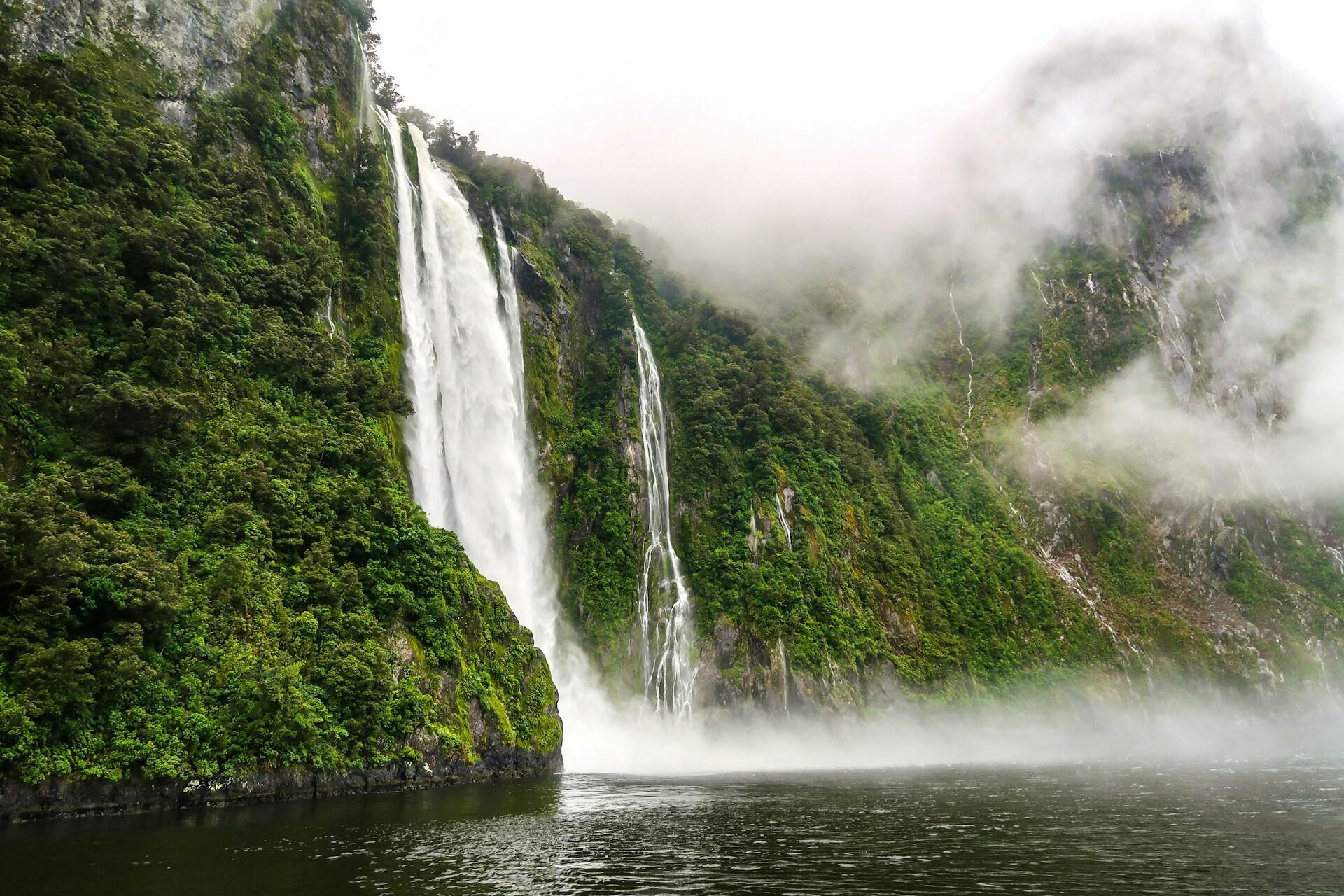
Milford Sound is technically a fiord, not a sound. Glaciers carved it and surrounded it by near-vertical mountains.
Mitre Peak rises dramatically to 1,692 metres and is one of the most photographed natural landmarks in New Zealand. If you're looking for even taller mountains, plan another trip to Aoraki, the tallest in New Zealand.
While it is located remotely at the end of Fiordland National Mark, it welcomes hundreds of thousands of visitors every year.
Don’t let rainy forecasts put you off! More rain means more waterfalls, and Milford Sound becomes even more dramatic in wet weather.
Where Is Milford Sound and How Do You Get There?
Milford Sound isn't necessarily easy to get to as it's tucked away in the remote southwest corner of New Zealand's South Island in the vast Fiordland National Park.
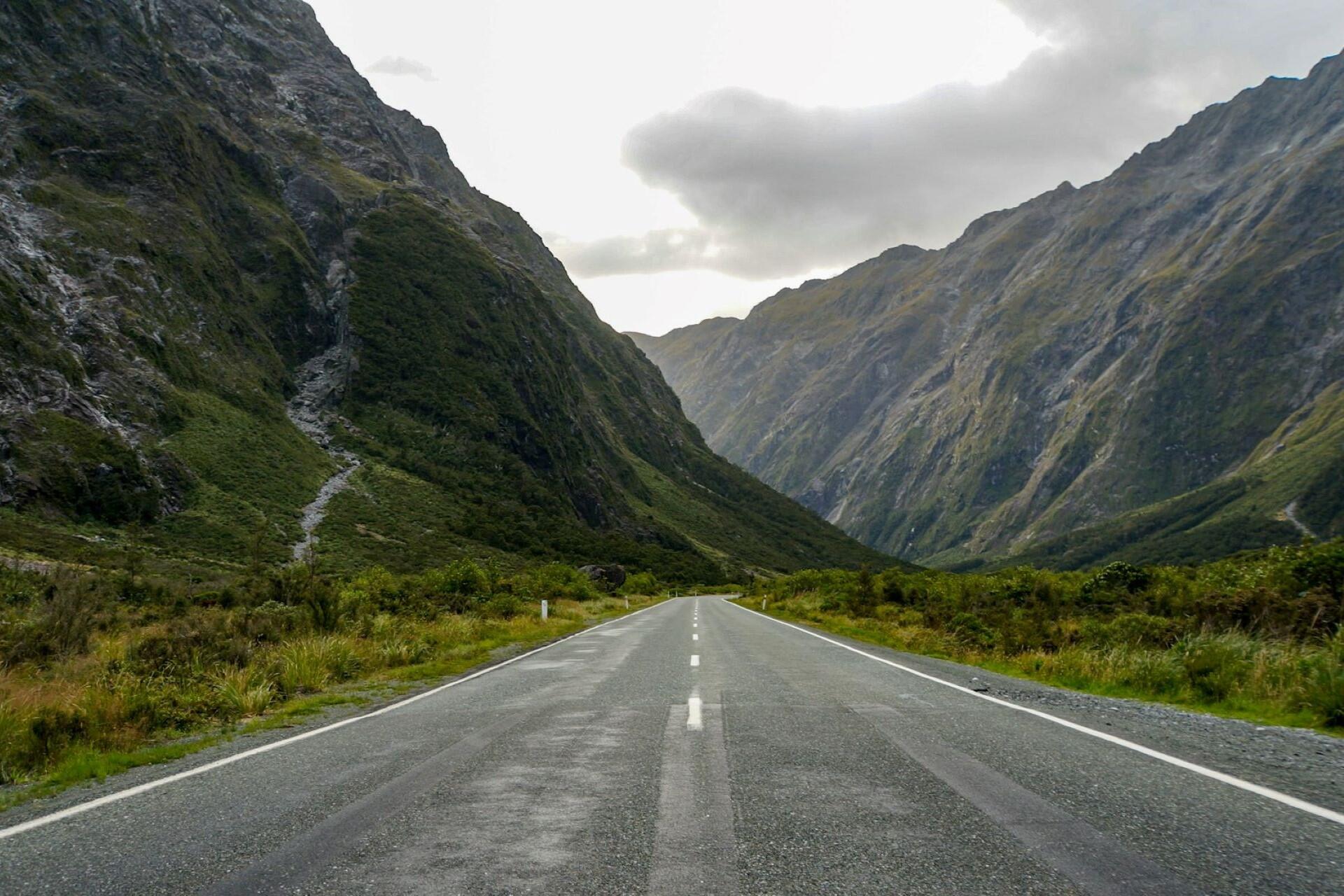
Milford Sound is the edge of the world in many ways, but you can get it to it, though not very easily.
If you're flying into Auckland, don't leave your camera in your suitcase!
As for Milton Sound, the closest towns are:
- Te Anau – About 2 hours away by road
- Queenstown – Around 4–5 hours by car or coach
- Invercargill or Dunedin – Longer drives, but possible with overnight stays
| Starting Point | Travel Time | Transport Options | Highlights |
|---|---|---|---|
| Te Anau | ~2 hrs | Self-drive, bus | Scenic lake views, forests |
| Queenstown | ~4–5 hrs | Coach tours, self-drive, fly | Mountain passes, stops along way |
| Rotorua/Auckland | Full-day+ | Multi-day tours only | Requires overnight itinerary |
Self-Drive, Bus or Fly? The Best Ways to Reach Milford Sound
The journey to Milford Sound is part of the adventure. How you choose to get there will shape your experience.
Do you want freedom and flexibility or a stress-free trip with scenic commentary?
Here are your options.
Self-Drive
Driving yourself gives you total control and the ability to stop along the stunning Milford Road (State Highway 94). Key photo stops include:
- Eglinton Valley
- Mirror Lakes
- The Chasm
- Homer Tunnel
Drive time from Queenstown: ~4–5 hours (longer with photo stops)
Drive time from Te Anau: ~2 hours
If you're looking for more of a fictional journey to photograph, be sure to visit the Hobbiton movie set in Matamata on the North Island.
Be aware that this remote road can be challenging in winter and may be closed due to rainfall, rockfall, or avalanche risk.
Coach or Bus Tours
A popular, relaxed way to take in the sights. Many tours include:
- Large panoramic windows for optimal scenic views
- Professional guides with knowledge of Fiordland National Park
- Package deals that include a Milford Sound cruise
Bonus: You won’t have to worry about the drive back after a long day.
Fly or Helicopter
Short on time? A scenic flight from Queenstown or Te Anau takes only 30–40 minutes. It offers jaw-dropping aerial views of the Southern Alps, glacier lakes, and fiords. You can also opt for a fly-cruise-fly combo for the ultimate day trip.
Flights are weather-dependent, so always book with a flexible mindset or have a backup plan.

Milford Sound vs Doubtful Sound: Which Fiord Should You Visit?
Milford Sound isn't the only thing worth visiting in Fiordland National Park. Doubtful Sound is a deeper and more remote alternative.
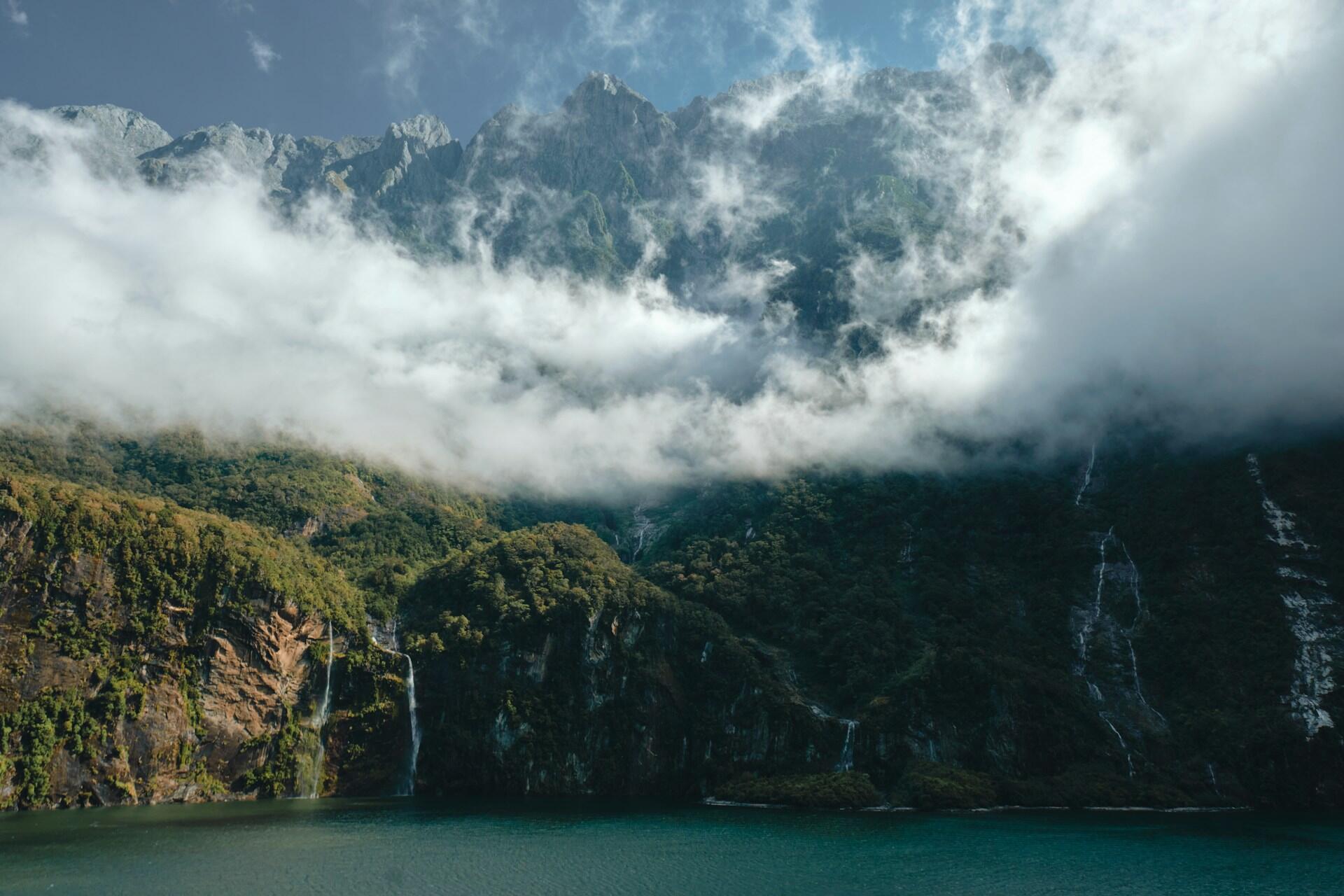
Both fiords are stunning, but the experiences they offer to photographers and visitors will differ.
Milford Sound
- Easier to access via self-drive, bus, or flight
- Offers multiple daily cruises and tours
- Home to Mitre Peak, Stirling Falls, and frequent wildlife sightings
- Often busy during peak seasons, especially midday tours
Doubtful Sound
- Twice as long and three times as deep as Milford Sound
- Less crowded, more tranquil. Ideal for nature lovers
- Requires a more complex route (boat and coach from Lake Manapouri)
- Feels wilder, more untouched
If you're short on time and looking for photographs that look like postcards, head to Milford Sound.
However, if you're after solitude, deep stillness, and off-grid travel experiences, Doubtful Sound is worth the extra effort it takes to get there.
Cruising Milford Sound: What to Expect on the Water
The best way to visit Milford Sound is by water. You might go for a scenic sail or an overnight journey, but a Milford Sound cruise is the best way to see one of the Earth's most dramatic landscapes.
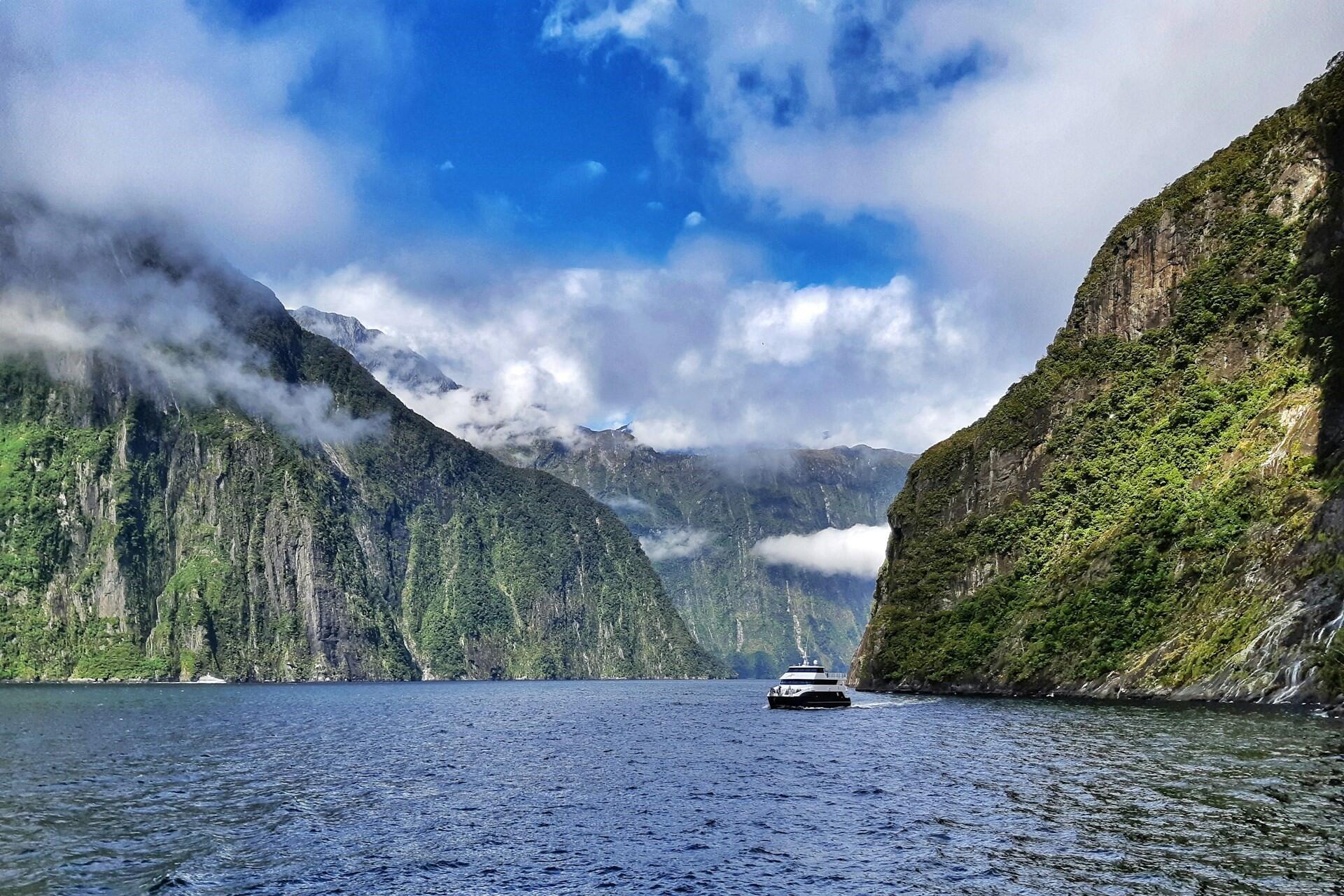
Types of Cruises
- Scenic Day Cruises – 1.5 to 2 hours long; includes narration, wildlife spotting, and close-up views of Stirling Falls and Lady Bowen Falls.
- Small Boat Cruises – More intimate and often quieter, perfect for photography and a deeper connection with the surroundings.
- Overnight Cruises – A magical experience with fewer crowds, stargazing, and the chance to wake up surrounded by nature and waterfalls.
What You'll See
- Towering peaks like Mitre Peak rise straight from the sea
- Dozens of temporary waterfalls after rain (which happens often!)
- Seals, dolphins, and occasionally even penguins
- Rainforest-covered cliffs, often cloaked in mist
Sit on the top deck for unobstructed views, —but pack a waterproof jacket, especially when the captain edges in close to the falls!
Popular Cruise Companies (via Tripadvisor ratings)
When to Visit Milford Sound: Weather, Rainfall & Best Seasons
Milford Sound looks completely different depending on when and how you visit. Different times of year will give you different experiences, so think carefully about when you plan your trip.
Summer (December–February)
- Most popular time to visit
- Longer days, warmer temperatures (around 18–25°C)
- Best for hiking and cruising in calmer seas
- Expect crowds. Book tours and accommodation in advance
Autumn (March–May)
- Cooler temps and fewer tourists
- Still plenty of sunny days mixed with rainfall
- Ideal for photography—misty mornings and moody light
Winter (June–August)
- Coldest time of year (often below 10°C)
- Fewer visitors = more peaceful cruises
- Stunning snow-capped peaks and crystal-clear air
- Road conditions can be risky—check weather reports
Spring (September–November)
- Waterfalls are full, flowers start to bloom
- A mix of sunshine and rainfall
- Great balance of accessibility and scenery
of rainfall per year, making it one of the wettest places on Earth.
Wildlife Encounters in Milford Sound: Seals, Dolphins & Birds
If you're looking for nature photographs, Milford Sound won't disappoint. There's plenty of wildlife, so it has protected status within Fiordland National Park.
New Zealand Fur Seals
These sleek, playful animals are often seen lounging on the rocks near Seal Rock. They are a favourite with visitors. Early mornings or cooler days are the best times to spot them.
Bottlenose Dolphins
Pod sightings are relatively common in the deeper parts of the fiord. They often swim alongside boats, riding the bow waves and putting on a show for lucky passengers.
Fiordland Crested Penguins
Spotted more often in spring and early summer, these rare and shy penguins are a special treat, especially for wildlife photographers. Look for them near shaded rocky outcrops.
Native Birdlife
The surrounding temperate rainforest and cliffs are home to birds like:
- Tūī
- Kea (alpine parrots known for their curiosity)
- Pīwakawaka (fantails)
Wildlife Photography Tips
Capture the Drama: Photography Tips for Fiordland’s Famous Views
As one of the most photographed locations in New Zealand, you'll quickly see examples of why Milford Sound is so popular.
It mixes moody light, mirror reflections, waterfalls, and vertical cliffs. The landscape is constantly changing, especially when it rains.
Here are our tips for getting the best photos of Milford Sound.
Timing is Everything
- Early morning: Calm waters = perfect reflections
- After rain: Dozens of waterfalls appear across the cliffs
- Golden hour: Warm light softens the dramatic edges of the fiord
- Overcast skies: Boost contrast, enhance mood. Perfect for black and white shots
What to Bring
- A wide-angle lens to capture the full scope of the fiord
- A dry bag or waterproof camera cover (rain can appear suddenly)
- Tripod for long exposures of Stirling Falls and low-light forest shots
- Lens cloths. You’ll need them with all the mist in the air
Best Spots to Shoot From
- Milford Sound Foreshore Walk (free and right near the car park)
- Cruise deck tops. Especially early or late in the day
- Kayaks offer low-angle water shots with a unique perspective
- Air. Scenic flights are unbeatable for a full-frame shot of the fiord
Summarise with AI:

